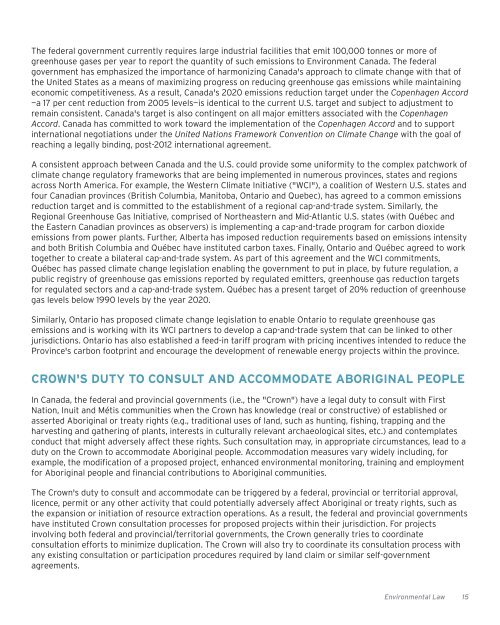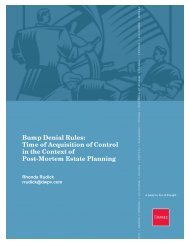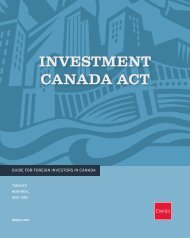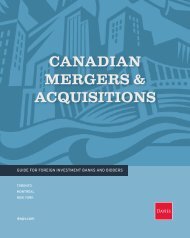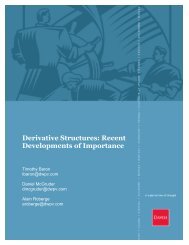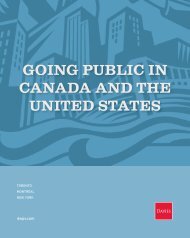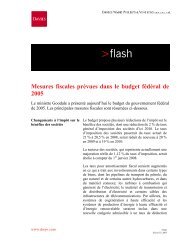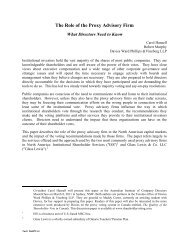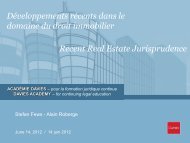Toronto. This community right-to-know program is <strong>in</strong>tended to expand on the current federal National PollutantRelease Inventory and Ontario's Toxics Reduction Strategy, which both focus on larger facilities.DIRECTOR AND OFFICER STATUTORY LIABILITYDirectors and officers of a corporation also have specific statutory obligations under federal and certa<strong>in</strong>prov<strong>in</strong>cial environmental laws to take reasonable care to ensure that the corporation complies with such laws.Under the federal Canadian Environmental Protection Act, 1999, directors and officers have a statutory duty totake reasonable care to ensure that the corporation complies with all requirements under that Act. In Ontario,there is a more limited statutory duty requir<strong>in</strong>g directors and officers to take all reasonable care to prevent thecorporation from (i) caus<strong>in</strong>g an unlawful discharge, (ii) contraven<strong>in</strong>g adm<strong>in</strong>istrative orders and (iii) contraven<strong>in</strong>gobligations with respect to approvals, notification of unlawful discharges and hazardous waste management. InQuébec, any director or officer who, by means of an order or authorization or through advice or encouragement,leads the corporation to refuse or neglect to comply with the EQA, commits an offence under the EQA.Directors and officers may also <strong>in</strong>cur operational liability if they are found to have personally permitted adischarge or deposit. In general, officers would be more likely than directors to be subject to such liability,because their management responsibilities may result <strong>in</strong> more control over the discharge or deposit (as opposedto the general supervisory role of directors).ENVIRONMENTAL IMPACT ASSESSMENTEnvironmental impact assessment is a tool used by the federal, prov<strong>in</strong>cial and territorial governments to ensurethat any significant adverse environmental impacts of a regulated project are considered and mitigated beforethe project is permitted to proceed. If the project is regulated <strong>in</strong> more than one jurisdiction, the federalgovernment has established cooperative agreements with most prov<strong>in</strong>ces and territories so that projects areassessed under one environmental assessment process.The federal Canadian Environmental Assessment Act requires an assessment where, among other th<strong>in</strong>gs, theproposed project <strong>in</strong>volves federal f<strong>in</strong>anc<strong>in</strong>g of lands or requires federal permits and approvals. As well, theprov<strong>in</strong>cial environmental impact assessment regimes also require an assessment of certa<strong>in</strong> private-sectorprojects. F<strong>in</strong>ally, <strong>in</strong> Canada's North, the federal government no longer has sole responsibility for assess<strong>in</strong>gproposed projects. As a result of comprehensive land claim settlements, self-government agreements anddevolution to territorial governments, the federal government now works with Aborig<strong>in</strong>al people, resource andenvironmental regulatory boards and the territorial governments to review and approve environmental impactassessments of proposed projects <strong>in</strong> Canada's North.Canada's environmental impact assessment process, particularly <strong>in</strong> Canada's North, presents a complexchallenge for project proponents and delays for controversial projects are common. Further, environmentalgroups and other stakeholders effectively use the courts to challenge environmental impact assessmentapprovals for controversial projects. As a result, judicial review of environmental impact assessments, even atthe early scop<strong>in</strong>g stage, is not uncommon and can cause project delays.CLIMATE CHANGECanada's climate change regulatory framework cont<strong>in</strong>ues to be characterized by significant uncerta<strong>in</strong>ty anddivergence as various mandatory and voluntary <strong>in</strong>itiatives cont<strong>in</strong>ue to emerge at the federal, prov<strong>in</strong>cial andregional levels <strong>in</strong> Canada.14 Environmental Law
The federal government currently requires large <strong>in</strong>dustrial facilities that emit 100,000 tonnes or more ofgreenhouse gases per year to report the quantity of such emissions to Environment Canada. The federalgovernment has emphasized the importance of harmoniz<strong>in</strong>g Canada's approach to climate change with that ofthe United States as a means of maximiz<strong>in</strong>g progress on reduc<strong>in</strong>g greenhouse gas emissions while ma<strong>in</strong>ta<strong>in</strong><strong>in</strong>geconomic competitiveness. As a result, Canada's 2020 emissions reduction target under the Copenhagen Accord—a 17 per cent reduction from 2005 levels—is identical to the current U.S. target and subject to adjustment torema<strong>in</strong> consistent. Canada's target is also cont<strong>in</strong>gent on all major emitters associated with the CopenhagenAccord. Canada has committed to work toward the implementation of the Copenhagen Accord and to support<strong>in</strong>ternational negotiations under the United Nations Framework Convention on Climate Change with the goal ofreach<strong>in</strong>g a legally b<strong>in</strong>d<strong>in</strong>g, post-2012 <strong>in</strong>ternational agreement.A consistent approach between Canada and the U.S. could provide some uniformity to the complex patchwork ofclimate change regulatory frameworks that are be<strong>in</strong>g implemented <strong>in</strong> numerous prov<strong>in</strong>ces, states and regionsacross North America. For example, the Western Climate Initiative ("WCI"), a coalition of Western U.S. states andfour Canadian prov<strong>in</strong>ces (British Columbia, Manitoba, Ontario and Quebec), has agreed to a common emissionsreduction target and is committed to the establishment of a regional cap-and-trade system. Similarly, theRegional Greenhouse Gas Initiative, comprised of Northeastern and Mid-Atlantic U.S. states (with Québec andthe Eastern Canadian prov<strong>in</strong>ces as observers) is implement<strong>in</strong>g a cap-and-trade program for carbon dioxideemissions from power plants. Further, Alberta has imposed reduction requirements based on emissions <strong>in</strong>tensityand both British Columbia and Québec have <strong>in</strong>stituted carbon taxes. F<strong>in</strong>ally, Ontario and Québec agreed to worktogether to create a bilateral cap-and-trade system. As part of this agreement and the WCI commitments,Québec has passed climate change legislation enabl<strong>in</strong>g the government to put <strong>in</strong> place, by future regulation, apublic registry of greenhouse gas emissions reported by regulated emitters, greenhouse gas reduction targetsfor regulated sectors and a cap-and-trade system. Québec has a present target of 20% reduction of greenhousegas levels below 1990 levels by the year 2020.Similarly, Ontario has proposed climate change legislation to enable Ontario to regulate greenhouse gasemissions and is work<strong>in</strong>g with its WCI partners to develop a cap-and-trade system that can be l<strong>in</strong>ked to otherjurisdictions. Ontario has also established a feed-<strong>in</strong> tariff program with pric<strong>in</strong>g <strong>in</strong>centives <strong>in</strong>tended to reduce theProv<strong>in</strong>ce's carbon footpr<strong>in</strong>t and encourage the development of renewable energy projects with<strong>in</strong> the prov<strong>in</strong>ce.CROWN'S DUTY TO CONSULT AND ACCOMMODATE ABORIGINAL PEOPLEIn Canada, the federal and prov<strong>in</strong>cial governments (i.e., the "Crown") have a legal duty to consult with FirstNation, Inuit and Métis communities when the Crown has knowledge (real or constructive) of established orasserted Aborig<strong>in</strong>al or treaty rights (e.g., traditional uses of land, such as hunt<strong>in</strong>g, fish<strong>in</strong>g, trapp<strong>in</strong>g and theharvest<strong>in</strong>g and gather<strong>in</strong>g of plants, <strong>in</strong>terests <strong>in</strong> culturally relevant archaeological sites, etc.) and contemplatesconduct that might adversely affect these rights. Such consultation may, <strong>in</strong> appropriate circumstances, lead to aduty on the Crown to accommodate Aborig<strong>in</strong>al people. Accommodation measures vary widely <strong>in</strong>clud<strong>in</strong>g, forexample, the modification of a proposed project, enhanced environmental monitor<strong>in</strong>g, tra<strong>in</strong><strong>in</strong>g and employmentfor Aborig<strong>in</strong>al people and f<strong>in</strong>ancial contributions to Aborig<strong>in</strong>al communities.The Crown's duty to consult and accommodate can be triggered by a federal, prov<strong>in</strong>cial or territorial approval,licence, permit or any other activity that could potentially adversely affect Aborig<strong>in</strong>al or treaty rights, such asthe expansion or <strong>in</strong>itiation of resource extraction operations. As a result, the federal and prov<strong>in</strong>cial governmentshave <strong>in</strong>stituted Crown consultation processes for proposed projects with<strong>in</strong> their jurisdiction. For projects<strong>in</strong>volv<strong>in</strong>g both federal and prov<strong>in</strong>cial/territorial governments, the Crown generally tries to coord<strong>in</strong>ateconsultation efforts to m<strong>in</strong>imize duplication. The Crown will also try to coord<strong>in</strong>ate its consultation process withany exist<strong>in</strong>g consultation or participation procedures required by land claim or similar self-governmentagreements.Environmental Law 15
- Page 1 and 2: DOING BUSINESSIN CANADAYOUR COMPLET
- Page 3 and 4: ONTENTSTABLE OF CONTENTSINTRODUCTIO
- Page 5 and 6: IntroductionPOLITICAL AND CONSTITUT
- Page 7 and 8: 5RealEstateIndustrial and Intellect
- Page 9 and 10: accordance with directions from the
- Page 11 and 12: TITLE INSURANCE, TITLE OPINIONS AND
- Page 13 and 14: 11EnvironmentalLawIndustrial and In
- Page 15: commercial activities, or carrying
- Page 19 and 20: 17Types ofBusiness OrganizationIndu
- Page 21 and 22: provincial law cannot do so as of r
- Page 23 and 24: partnership, limited partners’ li
- Page 25 and 26: parties. In Québec, joint venturer
- Page 27 and 28: 25Financing aBusiness OperationIndu
- Page 29 and 30: The Civil Code of Québec provides
- Page 31 and 32: 29CorporateGovernanceIndustrial and
- Page 33 and 34: Instrument 58-101. The practices re
- Page 35 and 36: 33CompetitionLawIndustrial and Inte
- Page 37 and 38: BID-RIGGINGBid rigging is any agree
- Page 39 and 40: anticompetitive agreements among co
- Page 41 and 42: 39ForeignInvestmentIndustrial and I
- Page 43 and 44: apply for Canadian citizenship. (Pe
- Page 45 and 46: (D)GENERAL REVIEW THRESHOLDSThe fol
- Page 47 and 48: there be an "acquisition of control
- Page 49 and 50: Industrial and Intellectual Propert
- Page 51 and 52: to perform or cause them to be perf
- Page 53 and 54: Registration grants an exclusive ri
- Page 55 and 56: PIPEDA applies in all provinces of
- Page 57 and 58: Employment LawCanadian employment l
- Page 59 and 60: displacement, laying-off, suspensio
- Page 61 and 62: easonable cause to believe that the
- Page 63 and 64: 63Retirement Plans, EmployeeBenefit
- Page 65 and 66: • funding;• eligibility;• pen
- Page 67 and 68:
67Temporary Entry andPermanent Resi
- Page 69 and 70:
INTERNATIONAL AGREEMENTSIn recent y
- Page 71 and 72:
immigrant in another class, he or s
- Page 73 and 74:
73Bankruptcy andInsolvency Proceedi
- Page 75 and 76:
BANKRUPTCYBankruptcy results in the
- Page 77 and 78:
INTERNATIONAL BANKRUPTCYASSETS LOCA
- Page 79 and 80:
Tax ConsiderationsThis chapter prov
- Page 81 and 82:
TAX REPORTINGAnnual Tax ReturnsCana
- Page 83 and 84:
Québec has legislation that limits
- Page 85 and 86:
Amendments, SIFTs and their unithol
- Page 87 and 88:
Conversely, where a Canadian reside
- Page 89 and 90:
A person, whether resident in Canad
- Page 91 and 92:
APPENDIX I: CANADA’S IN FORCE TAX
- Page 93:
TORONTODAVIES WARD PHILLIPS & VINEB


